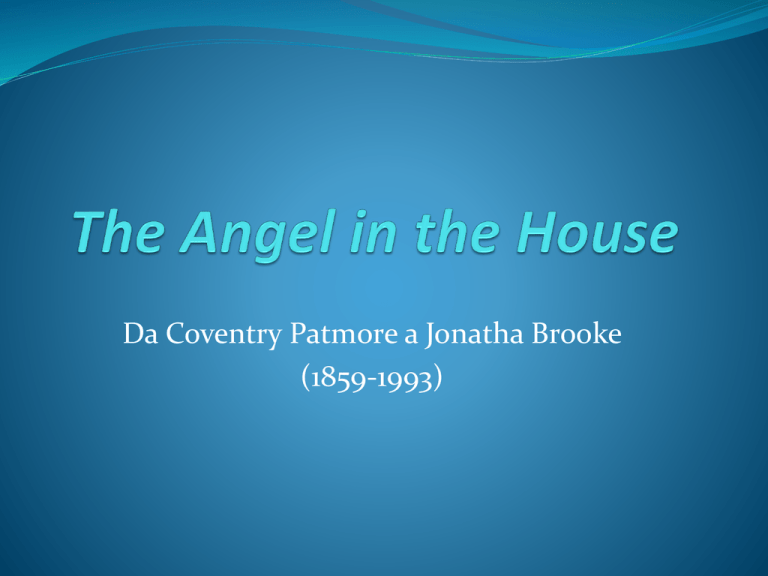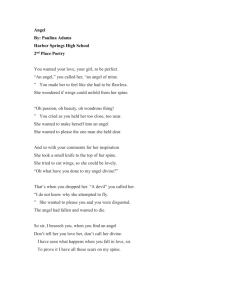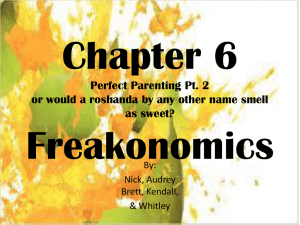
Da Coventry Patmore a Jonatha Brooke
(1859-1993)
Julia Margaret Cameron’s photograph “The Angel in the House”
“The Angel in the House was a domestic woman, a woman who had no
existence outside of the context of her home and whose sole window on
the world is her husband.”
Elaine Hartnell, “Nothing but Sweet and Womanly: A Hagiography of
Patmore’s Angel”, in Victorian Poetry 34.4 (1996): 457-476
Betty Friedan, The Feminine Mystique (1963).
Barbara Welter, The Cult of True Womanhood (1966).
“When masculinty and femininity are constructed to
generate such rigid and narrow gender roles, it
contributes to a culture of violence against women.
People with more resources are more likely to be
abusive towards those without resources” Hattery and
Smith, The Social Dynamics of Family Violence, (2012).
Simone de Beouvoir, Le deuxiéme sexe (1949).
Michel Foucault, Histoire de la Sexualité (1976).
Judith Butler, Gender Trouble (1990);
Undoing Gender (2004).
“True Womanhood”
PIETY
PURITY
SUBMISSION
DOMESTICITY
Coventry Patmore
Works by Coventry Patmore
Poetry
Poems (1844)
The Angel in the House (1854)
The Espousals (1856)
Faithful for Ever (1860)
The Victories of Love, (1862)
The Unknown Eros and other Odes (1877)
Essays
Principle in Art (1879)
Religio Poetae (1893)
The Rod, the Root, and the Flower (1895)
Courage in Politics, and Other Essays (1885-1896)
Emily Augusta Andrews
The Angel in the House
Four Parts
The Angel in the House (1854)
The Espousals (1856)
Faithful Forever (1860)
The Victories of Love (1862)
Man must be pleased; but him to please
Is woman's pleasure; down the gulf
Of his condoled necessities
She casts her best, she flings herself.
How often flings for nought! and yokes
Her heart to an icicle or whim,
Whose each impatient word provokes
Another, not from her, but him;
While she, too gentle even to force
His penitence by kind replies,
Waits by, expecting his remorse,
With pardon in her pitying eyes.
And if he once, by shame oppress’d,
A comfortable word confers,
She leans and weeps against his breast,
And seems to think the sin was hers;
Or any eye to see her charms,
At any time, she’s still his wife,
Dearly devoted to his arms,
She loves with love that cannot tire;
And when, ah woe, she loves alone,
Through passionate duty love springs higher,
As grass grows taller round a stone.
His merits in her presence grow,
to match the promise in her eyes,
and round her happy footsteps blow
the authentic airs of Paradise.
“This centrality of the male narrator may be construed as
simply keeping in with the gender relationship obtaining
during the Victorian era (461).”
Elaine Hartnell, “Nothing but Sweet and Womanly: A
Hagiography of Patmore’s Angel”, (1996).
“Women have been associated in a stereotypical way with
both good and evil. As an angel in the house, woman has
been credited with natural goodness, an innate allegiance
to a law of kindness. But this same description extals her as
infantile, weak and mindless. A creature in costant need of
a male supervision and protection. Undertones of sadism
run throughout Coventry Patmore’s hymn to the angel who
is in reality a prisoner in the house she graces (59)”.
Nel Noddings, Women and Evil, (1984).
“The Angel in the House is a victorinisation of one of
the major abstractions of courtly lyric and romance
(Honour)” (140).
“Honoria is for Felix (the felix wooer) what Beatrice is
for Dante, but a Beatrice that finally marries him , the
Queen of immaculate, clearly unadulterous espousals.
A transformation has occurred: the mistress is also the
wife”(145).
Maurice Montabrut, “Courtly Manners in a Victorian
Home: Patmore’s The Angel in the House” (1994)
“And while I was writing this review, I discovered that if I were going to
reviewbooks I should need to do battle with a certain phantom. And
the phantom was a woman, and when I came to know her better I
called her after the heroine of a famous poem, The Angel in the House.
It was she who used to come between me and my paper when I was
writing reviews. It was she who bothered me and wasted my time and
so tormented me that at last I killed her. You who come of a younger
and happier generation may not have heard of her--you may not know
what I mean by the Angel in the House. I will describe her as shortly as
I can. She was intensely sympathetic. She was immensely charming.
She was utterly unselfish. She excelled in the difficult arts of family life.
She sacrificed herself daily. If there was chicken, she took the leg; if
there was a draught she sat in it--in short she was so constituted that
she never had a mind or a wish of her own, but preferred to sympathize
always with the minds and wishes of others. Above all--I need not say
it---she was pure. Her purity was supposed to be her chief beauty--her
blushes, her great grace. In those days--the last of Queen Victoria-every house had its Angel. And when I came to write I encountered her
with the very first words. The shadow of her wings fell on my page; I
heard the rustling of her skirts in the room.
Directly, that is to say, I took my pen in my hand to review that novel by a
famous man, she slipped behind me and whispered: "My dear, you are a young
woman. You are writing about a book that has been written by a man. Be
sympathetic; be tender; flatter; deceive; use all the arts and wiles of our sex.
Never let anybody guess that you have a mind of your own. Above all--I need
not say it---she was pure. Her purity was supposed to be her chief beauty--her
blushes, her great grace. In those days--the last of Queen Victoria--every house
had its Angel. And when I came to write I encountered her with the very first
words. The shadow of her wings fell on my page; I heard the rustling of her
skirts in the room. Directly, that is to say, I took my pen in my hand to review
that novel by a famous man, she slipped behind me and whispered: "My dear,
you are a young woman. You are writing about a book that has been written by
a man. Be sympathetic; be tender; flatter; deceive; use all the arts and wiles of
our sex. Never let anybody guess that you have a mind of your own. Above all,
be pure." And she made as if to guide my pen. I now record the one act for
which I take some credit to myself, though the credit rightly belongs to some
excellent ancestors of mine who left me a certain sum of money--shall we say
five hundred pounds a year?--so that it was not necessary for me to depend
solely on charm for my living.
I turned upon her and caught her by the throat. I did my best to kill
her. My excuse, if I were to be had up in a court of law, would be that I
acted in self-defence. Had I not killed her she would have killed me.
She would have plucked the heart out of my writing. For, as I found,
directly I put pen to paper, you cannot review even a novel without
having a mind of your own, without expressing what you think to be
the truth about human relations, morality, sex. And all these questions,
according to the Angel of the House, cannot be dealt with freely and
openly by women; they must charm, they must conciliate, they must-to put it bluntly--tell lies if they are to succeed. Thus, whenever I felt
the shadow of her wing or the radiance of her halo upon my page, I
took up the inkpot and flung it at her. She died hard. Her fictitious
nature was of great assistance to her. It is far harder to kill a phantom
than a reality. She was always creeping back when I thought I had
despatched her. Though I flatter myself that I killed her in the end, the
struggle was severe; it took much time that had better have been spent
upon learning Greek grammar; or in roaming the world in search of
adventures. But it was a real experience; it was an experience that was
bound to befall all women writers at that time. Killing the Angel in the
House was part of the occupation of a woman writer.”
Virginia Woolf, Professions for Women (1942).
“For many years I suffered from a severe and continuous nervous
breakdown tending to melancholia-and beyond. During about
the third year of this trouble I went, in devout faith and some
faint stir of hope, to a noted specialist in nervous diseases, the
best known in the country. This wise man put me to bed and
applied the rest cure, to which a still good physique responded so
promptly that he concluded that there was nothing much the
matter with me, and sent me home with solemn advice to `live as
domestic a life as possible,’ to `have but two hours’ intelligent life
a day,’ and `never to touch pen, brush or pencil again’ as long as I
lived. This was in 1887. I went home and obeyed those directions
for some three months, and came so near the border line of utter
mental ruin that I could see over”.
Charlotte Perkins Gilman, The Yellow Wall Paper and Other Stories
(1892)
American Feminist folk duo The Story publishes
the album The Angel in the House in 1993












